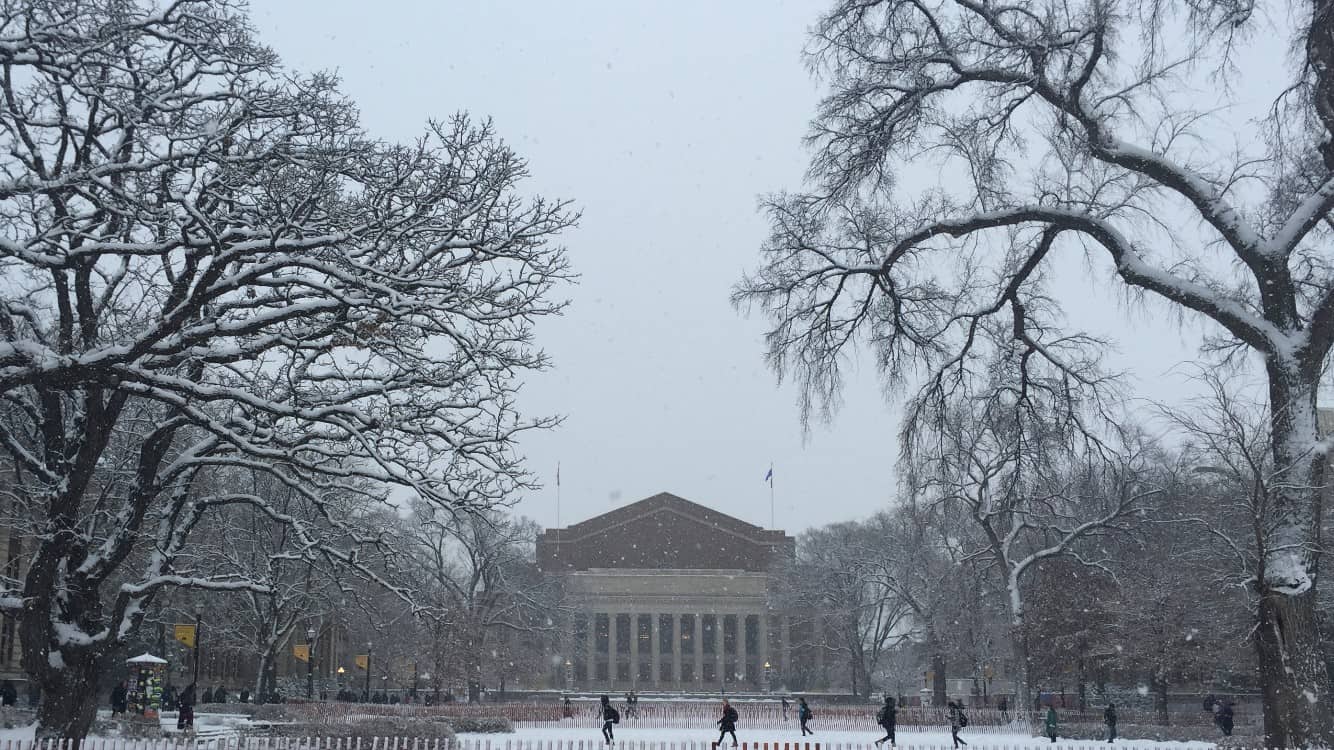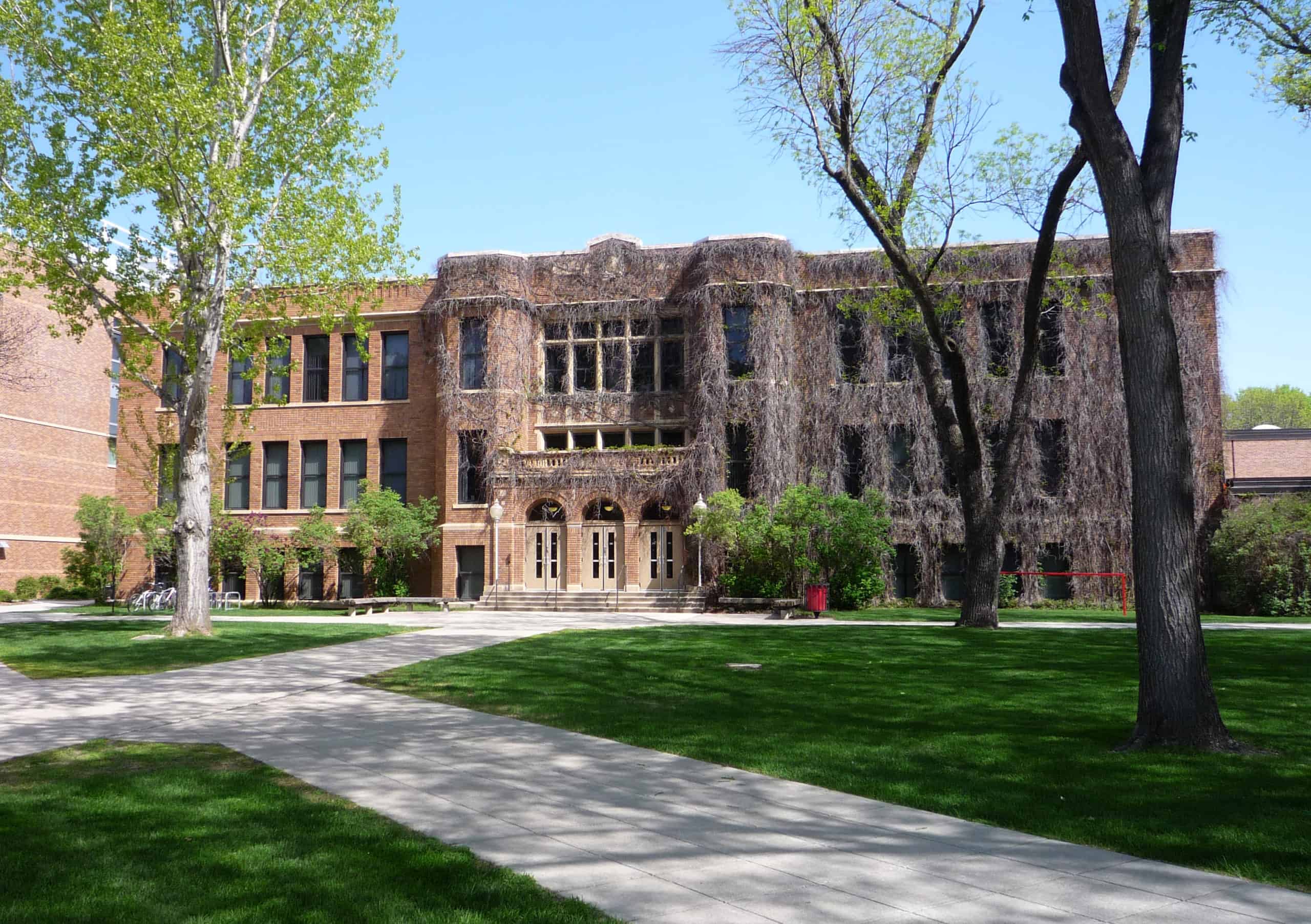Best Colleges & Universities in Minnesota 2023
We all know Minnesota is the Land of 10,000 Lakes, but did you know it is also the land of over 100 public and private institutions of higher learning? Minnesota actively seeks to attract students to its beautiful borders through programs and agreements designed to help students financially survive college.
The Minnesota Office of Higher Education has what are called “reciprocity agreements” with the neighboring states of Wisconsin, North Dakota, and South Dakota, as well as the Canadian province of Manitoba. There is a limited agreement with Iowa Lakes Community College. The agreements allow students from those states to pay lower tuition rates than other out-of-state students. See if you could take part in this program by visiting https://www.ohe.state.mn.us/mPg.cfm?pageID=97.
Online Programs That Might Interest You
Learn about start dates, transferring credits, availability of financial aid, and more by contacting the universities below.Minnesota also wants to help students who want to attend school in several other states. It participates in the Midwest Student Exchange Program, which allows students from participating states to pay no more than 150% of the in-state tuition at another participating state’s colleges or universities. Learn about this and find out if you could participate in this program by visiting https://www.mhec.org/programs/midwest-student-exchange-program.
Minnesota can attract the eyes of outdoors fans and frugal college students. With so many college choices to look at and so many financial assistance programs all available in Minnesota, it may be just the place for you.
Rankings
EDsmart assesses colleges in Minnesota based on data that covers four main areas:
- Cost (average net price)
- Academic quality (graduation rate)
- Student satisfaction (retention rate)
- Salary After Attending (the median earnings of former students who received federal financial aid, 10 years after entering the school)
All data was gathered from the U.S. Department of Education websites College Scorecard and College Navigator.
This ranking aims to help students assess the affordability and value of colleges and universities in Minnesota so they can make informed decisions about which college to attend.
Best Colleges in Minnesota for 2023
Four Year Universities
1. University of Minnesota-Morris
Score: 100.0
Average Net Price: $10,529
Retention Rate: 78%
Graduation Rate: 61%
Salary After Attending: $47,373
Founded in 1960, this public liberal arts college offers 35 majors and 32 minors. The University of Minnesota-Morris is known for offering quality education at an affordable cost. Many students study abroad, and many graduates pursue advanced degrees. Psychology and English are the two most popular majors in schools. The music department at the school is well-known for its jazz musicians. Jim Carlson, a professor of music at the university, founded Jazz Fest in 1979. The events of the festival were broadcast online in 2009. Alumni of the university include the current Chief Justice of the Minnesota Supreme Court, Lorie Skjerven Gildea, associate professor of biology PZ Myers, and singer Cynthia Johnson.
2. University of Minnesota-Rochester
Score: 99.4
Average Net Price: $15,636
Retention Rate: 78%
Graduation Rate: 64%
Salary After Attending: $61,201
Renowned for its emphasis on the health sciences, the University of Minnesota-Rochester (UMR) stands as a distinguished institution situated in the heart of Med-City. This prime location grants students unrivaled access to exceptional healthcare facilities and esteemed professionals. UMR proudly presents an array of health-related programs, including the esteemed Bachelor of Science in Health Sciences (BSHS) and the esteemed Bachelor of Science in Health Professions (BSHP).
The BSHS program serves as an excellent choice for students seeking diverse opportunities within the health science realm. This program seamlessly blends a comprehensive foundation in the fundamental sciences with the chance to delve into various specializations.
On the other hand, the BSHP program offers a specialized curriculum meticulously tailored to equip students for thriving careers in echocardiography, radiography, respiratory care, and sonography. Through clinical rotations at Mayo Clinic, students gain invaluable hands-on experience in these fields.
Both programs boast a dedicated faculty comprising seasoned professionals unwavering in their commitment to providing students with a superlative education. Notably, UMR boasts an absence of teaching assistants, ensuring students enjoy the privilege of personalized support directly from their professors, should they require it.
UMR emerges as an exceptional choice for those aspiring to pursue a career in the health sciences. The university encompasses a diverse selection of programs, a faculty brimming with expertise, and unprecedented access to world-class healthcare facilities.
3. University of Minnesota-Twin Cities
Score: 99.4
Average Net Price: $17,878
Retention Rate: 93%
Graduation Rate: 80%
Salary After Attending: $61,201
This university has graduated distinguished alumni who have won Nobel Prizes and Pulitzer Prizes. The quality of this school has been compared to the quality of Ivy League schools; hence it's “Public Ivy” ranking. The school has a particularly distinguished math department. The school is also known for its fraternities and sororities. There are more than 200 such organizations on campus. Six hundred more student groups are also on campus, and students who wish to create a group for their own purposes are encouraged to do so. Adult learners are also welcome to apply to the school, and they will find several college programs available to help them progress with their education. An exceptional faculty helps promote diversity and interdisciplinary approaches to complex subjects. The university is well known for its research; the school graduates many students who go on to win famous prizes for their work, and the school has spent over $940 million in research expenditures.
4. University of Minnesota-Duluth
Score: 97.0
Average Net Price: $18,505
Retention Rate: 80%
Graduation Rate: 61%
Salary After Attending: $54,750
This public university offers students a wide range of choices from 84 majors. It also has a two-year program for Medicine and a four-year College of Pharmacy program. The school has had a long development history. It was initially intended just for women and gradually became a college for all students during the mid-1900s. Student culture promotes the flourishing of several fraternities and student organizations. 96% of the school graduates are either employed or are pursuing advanced degrees. The research programs are designed to improve Minnesota's health and develop sustainable practices for the environment. The school is distinguished by the numerous doctors trained to serve rural areas and American Indian communities. The school also has among its alumni several accomplished athletes, including hockey players.
5. Metropolitan State University
Score: 96.6
Average Net Price: $16,044
Retention Rate: 72%
Graduation Rate: 57%
Salary After Attending: $56,402
This institution was founded in 1971 to serve non-traditional students who could not access resources provided by other schools in the state. Since then, the college has adjusted and refined its approach to learning to make it a major center of learning in its own right. Adult learners, students with children, students with full-time jobs, and students transitioning into significant life changes are welcome at this college. The school is known for serving a frequently overlooked student population. Students may get degrees in career-oriented majors such as Research and Information Studies or other fields such as Physics or Religious Studies. Students are encouraged to join student organizations. Students with insufficient members to begin a full-fledged student organization may start a Small Community instead. Successful Small Community leaders are encouraged to further their leadership skills by starting a student organization later in their college career.
6. University of Minnesota-Crookston
Score: 96.4
Average Net Price: $11,593
Retention Rate: 68%
Graduation Rate: 55%
Salary After Attending: $47,869
The University of Minnesota-Crookston is a high-ranking, technology-driven university. UM-Crookston provides all students and faculty with laptop computers. The school is among the first colleges to give all full-time students a standard-model laptop computer. The college has plenty of online students; half the student body learns online. The school's faculty encourages students to use hands-on approaches to learning. They present leadership and internship opportunities to many of the students. UM-Crookston is also known for having a student body with remarkably low student debt. Financial aid is often generous to incoming freshman students. Applicants who wish to apply to this school should plan to emphasize their high school grades and experiences. Test scores are optional. Applicants who homeschool or attend a non-graded school must submit SAT or ACT scores. Employers consistently say that school graduates are among the best-prepared people to work in a high-tech field.
7. Winona State University
Score: 96.4
Average Net Price: $17,634
Retention Rate: 76%
Graduation Rate: 65%
Salary After Attending: $51,346
This public university is one of Minnesota's oldest schools with a good reputation. Initially established in the 1850s, this school was meant to produce a substantial quantity of competent high school teachers. The university is known in the state for promoting a good working relationship between learning and modern technology. The school is among the first universities to lease laptops to full-time students on campus. Each student pays a small fee to the university to help fund a non-profit for Minnesota students. The school offers Presidential Honor Scholarships for international students with outstanding credentials. International students are expected to share their culture with American students, as the Cross-Cultural Outreach Program requires. Although students are generally expected to participate in the campus culture, the university has a robust online program for distance learners who cannot make a traditional college experience a part of their lives.
8. Minnesota State University-Mankato
Score: 96.2
Average Net Price: $17,159
Retention Rate: 78%
Graduation Rate: 54%
Salary After Attending: $51,689
This public university offers 130 undergraduate programs of study. Its aviation program further distinguishes the college. MSU-Mankato is among the best colleges in MN for those who want to prepare for pilot training. Students who cannot attend college may complete their university degrees with online college programs. A large number of students who graduate find jobs in fields that are related to what they studied. The university was one of the first schools in the country to offer a Master of Fine Arts degree in forensics. In-state tuition fees are affordable, making this an attractive choice for native Minnesotans. The college will admit any student who graduated in the top 50% of their high school, has a GPA of at least 3.0, or achieves an ACT of at least 21. Those who do not meet these requirements will still be evaluated based on other factors, such as college preparation work or the likelihood of succeeding in a university environment.
9. Concordia University-Saint Paul
Score: 96.0
Average Net Price: $15,880
Retention Rate: 66%
Graduation Rate: 62%
Salary After Attending: $53,164
This private liberal arts university offers students both an on-campus and online education. The students may choose from various majors, certificates, and graduate programs. The location of the university provides students with a rich environment for seeking internships and entry-level jobs. Its admissions process distinguishes the university; students are not required to submit test scores as part of their application package. Students who feel that their test scores reflect essential aspects of their scholarly abilities they may send in the scores as part of their package. The test-optional policy will not impact international students. The university has religious affiliations. Students who want to enjoy these affiliations can join a Concordia ministry or student group. They also conduct worship on campus. The university is also distinguished by its church work programs that offer an internship experience for students interested in service.
10. Saint Cloud State University
Score: 94.6
Average Net Price: $14,581
Retention Rate: 67%
Graduation Rate: 50%
Salary After Attending: $51,372
This public university in Saint Cloud is one of the largest universities in the state. At least 14,000 students attend college. Students may choose from over 200 majors. The university is known for having enjoyable and distinctive undergraduate majors such as meteorology and mapping sciences. Students participate in “Mainstreet,” a showcasing for communities and campus services each year. Those who cannot go to campus may enroll in online programs. The college ranks among one the best schools for student veterans. The university has shown a commitment to providing resources for military students so that they may enjoy a successful college career. The in-state tuition is reasonable, making it one of the most affordable schools in the nation.
11. Martin Luther College
Score: 93.8
Average Net Price: $22,205
Retention Rate: 84%
Graduation Rate: 69%
Salary After Attending: $40,821
This private liberal arts college was established in 1995. Men who graduate from the college seminary program may pursue advanced seminary degrees at the Wisconsin Lutheran Seminary. The school is mainly a Christian institution that offers several theology-based programs to interested students. Faculty hired by the college are expected to be highly committed to ministry and are expected to communicate a passion for Lutheran ministry to their students. Online or satellite courses are available for distance learners. The relatively small community and shared religious beliefs promote student bonding.
12. Bemidji State University
Score: 93.6
Average Net Price: $16,033
Retention Rate: 72%
Graduation Rate: 50%
Salary After Attending: $46,619
Initially founded as a teacher’s preparatory school in 1919, this public state university is now home to over 6,000 students yearly. Many of the school courses are available online. This school is distinguished by the very high rate of students who pass their social work licensing exams; 96% of social work majors successfully qualify for employment. In comparison, only 76% of the entire state of Minnesota passes the licensing exams. The university is also set apart by its relationship with Liaoning University in China. The two schools have enjoyed a 16-year relationship that promotes education on Chinese culture. Every year a Liaoning professor attends Bemidji to teach Chinese. Every summer, a selection of Bemidji students go to Liaoning to study and tour the country. The university also demonstrates care for the environment; a bike rental service exists on campus for students who require transportation. For students who need to gain real-world experience, the school offers several internships in different cities.
13. Minnesota State University Moorhead
Score: 93.4
Average Net Price: $17,680
Retention Rate: 73%
Graduation Rate: 53%
Salary After Attending: $47,117
This public university was established in 1887. The Minnesota State University-Moorhead trained young people to become qualified high school teachers for several decades. The advent of the Second World War meant aviators were needed, so the school helped train aviation students. The school is now distinguished by the number of teachers who have won the CASE Carnegie Foundation for the Advancement of Teaching Professors of the Year Award. Every year, the school sponsors a Student Academic Conference. This conference is meant to help students promote their work to faculty and other more established researchers. The university is also distinguished by the large number of study-abroad programs it maintains. There are school study-abroad programs in China, Japan, Korea, Taiwan, Australia, England, and Norway. The university is also unusually affordable. The cost of college is among the lowest in the state.
14. Southwest Minnesota State University
Score: 92.8
Average Net Price: $13,872
Retention Rate: 70%
Graduation Rate: 49%
Salary After Attending: $43,800
This large public university developed the nation’s first culinology program. The university offers over 55 undergraduate majors and several extracurricular opportunities. Despite the relative youth of this school, it boasts a highly accomplished set of alumni that have gone on to achieve much in the arts and business. The most popular majors are Business, Childhood Education, and Elementary Education. Both in-state and out-of-state tuition are reasonably priced, making this an attractive option for any applicant.
Further Reading: Cheapest Affordable Online College Rankings
15. Bethany Lutheran College
Score: 92.4
Average Net Price: $16,107
Retention Rate: 79%
Graduation Rate: 53%
Salary After Attending: $40,621
This private Christian liberal arts college has a small student body living on a campus with 50 acres of land. The school is known for providing its students with an affordable education, with 98% of the student body receiving financial aid. Chapel services, which happen every morning for fifteen minutes, are a big part of the campus's culture. They encourage all students to attend the brief Christian Lutheran service before heading out for class. The school chaplain hosts Bible study groups. Every year, students at Bethany have to take religion classes, so they have to sign up for one each semester. Minors are available to interested students. They may choose from interesting minors, such as the Communication Disorders minor.
16. Herzing University-Minneapolis
Score: 85.6
Average Net Price: $23,164
Retention Rate: 53%
Graduation Rate: 67%
Salary After Attending: $33,093
Herzing University is a small, private institution in St. Louis Park, Minnesota. They have an undergraduate enrollment of 305 students. The school boasts an acceptance rate of 92%. Herzing University-Minneapolis offers degrees at the associate, bachelor, master, and doctoral levels. Students can choose to study from six schools, the school of nursing, healthcare, public safety, business, legal studies, and technology. Students at Herzing University-Minneapolis can choose from various programs that give them hands-on learning. For example, the Medical Assisting program offers students an opportunity to work with actual patients and learn about the medical field.
Two Year Colleges
1. Dakota County Technical College
Score: 94.4
Average Net Price: $11,044
Retention Rate: 70%
Graduation Rate: 41%
Salary After Attending: $45,691
This public technical school is one of five technical schools in the state. The college has about 40 degree programs and 60 certificate and diploma programs. These range from construction and manufacturing to healthcare, visual arts to business, and include 57 instructional programs under six academic departments. Students may enroll in brewing, HVAC, interior design, or transportation management. DCTC has one of the top-ranked nursing programs in the nation and made Military Times’ Best for Vets: Top Colleges 2020 list. Students who graduate from school are attractive to employers, with 97% of employers indicating a willingness to hire more Dakota County school, graduates. The college offers short-term programs for students who cannot manage long-term commitments.
2. St. Cloud Technical and Community College
Score: 92.4
Average Net Price: $9,249
Retention Rate: 56%
Graduation Rate: 37%
Salary After Attending: $46,359
St. Cloud Technical and Community College began in 1948. Students may acquire Associate of Arts, Associate of Science, and Associate of Applied Science degrees from a wide variety of majors. Interested students will be able to acquire certificates and advanced technical certificates. The college is known for its remarkable affordability, with within and out-of-state tuition for 2019 standing at $5,295. Eighty percent of SCTCC students receive financial aid, which makes it even more affordable. All accepted students are required to take the “Accuplacer” test, which gauges reading and math skills. Students at this school may choose from majors such as Finance, IT, or Culinary Arts. They may select vocational training programs such as Carpentry, Plumbing, or Land Surveying. Students who cannot have an on-campus experience may be able to begin and complete a degree online.
3. Riverland Community College
Score: 91.8
Average Net Price: $9,149
Retention Rate: 65%
Graduation Rate: 40%
Salary After Attending: $39,275
This public community college serves a large student body through a blend of traditional, hybrid, and online programs. Students may acquire bachelor’s degrees, two-year transfer degrees, diplomas, and certificates. Acceptance into Riverland Community College does not always guarantee admission into specific programs, which often require separate application packages. Students who want training for a particular vocation may be able to find vocational training at this school. RCC is also a good option for adult learners who want to enhance or complete their education. The college offers programs designed exclusively for adult learners and ways to transfer credits based on life experience. The school also serves veteran students.
4. North Hennepin Community College
Score: 91.8
Average Net Price: $10,081
Retention Rate: 57%
Graduation Rate: 23%
Salary After Attending: $47,257
North Hennepin Community College began in 1966. This school is a small institution that is welcoming to a diverse student body. The school is open to students with children and has apportioned rooms and locations for mothers. The school is also welcoming to students of color with multicultural programs on campus, including the American Indian Education Initiative, Asian Heritage Initiative, Black Men’s Leadership Movement, Global Salaam Initiative, Latino Success Initiative, Weak Yet Strong, and Women on Wednesdays. The school also has a sustainability committee for those interested in protecting the environment. Tuition is affordable. In 2019, in and out-of-state tuition was about $5,708 every year. Financial aid may be available to qualifying students. Summer sessions are available to students who wish to accelerate their degree progress. All entering students must take placement testing or submit college placement scores that qualify as an alternative to placement testing.
5. Hibbing Community College
Score: 91.6
Average Net Price: $8,736
Retention Rate: 62%
Graduation Rate: 34%
Salary After Attending: $40,829
Initially started in 1916, this community college began in a room of Hibbing High School and eventually developed its own campus in 1969. Its technical college was created to serve the Hibbing area and eventually merged with the community college. The campus has an open enrollment policy, meaning that any student with a high school diploma or a GED will be accepted. Specific programs may require separate applications. The education at the community college is affordable, especially for in-state residents; many classes are not much more than $200. Students may also apply for financial aid. Once accepted, students must take a placement test to gauge their learning skills and ability to comprehend reading passages. Applicants who wish to prepare for this test may visit the college website and practice with the linked sample questions and materials.
6. Minnesota State Community and Technical College
Score: 91.4
Average Net Price: $11,244
Retention Rate: 63%
Graduation Rate: 39%
Salary After Attending: $41,470
The Minnesota State Community and Technical College serve a large student body of about 9,000 people. The school has multiple campuses in Minnesota. The school offers more than 70 programs for students. Acceptance to the school is simple; the online application and high school or college transcripts are required. The application fee is approximately $20. Accepted students must go through the online orientation, which lasts about 30 minutes. Doing this will allow the student to enroll in classes. The school is highly affordable. Most students in the school enjoy a free education through a mixture of grants and scholarships that do not require payback. Housing options are available to students who want to attend on campus. Accepted students will need to take the placement exam. However, those who have already gained a certain level of education or who have scored well on college placement tests may be exempt from placement testing.
7. Northland Community and Technical College
Score: 90.8
Average Net Price: $11,586
Retention Rate: 57%
Graduation Rate: 45%
Salary After Attending: $41,091
One of the standout features of NCTC is its aerospace site in Thief River Falls and a satellite site in Roseau. Students may acquire diplomas, degrees, and certificates in more than 80 areas of study. Students who want vocational training can get this from the school’s vocational programs. The school’s two campuses serve over 4,000 students. Financial aid is available to students who demonstrate a need. The Accuplacer placement test is a requirement for all admitted students. Those who score well on the ACT, SAT, or MCA may be able to skip the placement test before enrollment. Advisors will assist accepted students with class registration. This school has also demonstrated a willingness to offer military veterans support. The school has resources to ensure veterans who apply can access all benefits to which they are entitled. Most veterans may enjoy free education at the community college if they can get Federal Tuition Assistance.
8. Minnesota West Community and Technical College
Score: 90.2
Average Net Price: $11,439
Retention Rate: 57%
Graduation Rate: 49%
Salary After Attending: $39,460
Although this public community and technical college was formally established in 1997, the individual campuses have at least 75 years old history. The campuses have traditions of providing the local community with educational resources and vocational training. Students may pursue degrees or certificates in more than 60 areas. Some specific programs in the school may require a special application apart from the general admission application. MWCTC is also welcoming to students with children or families. The Post-Secondary Child Care Grant Program helps low-income students pay for childcare as they attend class. The Granite Falls campus has child care available through Puddle Jumpers Learning Center. Students who need more resources on the other campus sites may be able to get assistance through the Southwestern Minnesota Opportunity Council (SMOC) Child Care Resource.
9. Century College
Score: 90.0
Average Net Price: $10,397
Retention Rate: 58%
Graduation Rate: 26%
Salary After Attending: $43,353
Century College is a public school located in White Bear Lake, Minnesota. Total enrollment on campus is 8,891. Niche.com gave Century College an overall grade of B- for its upstanding academics, diversity, and safety. At Century College, you'll have the opportunity to learn about a wide range of careers and skill-set areas. You can get a job or continue your studies at a four-year university with courses from our career-focused programs. Some popular majors at the college include Liberal Arts, Nursing assistants, and Nursing.
10. South Central College
Score: 89.6
Average Net Price: $10,358
Retention Rate: 57%
Graduation Rate: 36%
Salary After Attending: $40,025
South Central College is located in Faribault and North Mankato. The tuition is affordable. Students may have to pay as little as $2,689 each semester. Financial aid and scholarships are available to students who demonstrate need. The school has relationships with many businesses and institutions that may employ students or offer internships.
11. Mesabi Range College
Score: 89.4
Average Net Price: $11,388
Retention Rate: 57%
Graduation Rate: 38%
Salary After Attending: $40,419
This public community college is often used by local high school students who take classes at the school to transfer to their future college of choice. A student who received at least a math SAT score of 530 may skip the math placement test. Orientation is mandatory for those who are about to begin the fall semester.
12. Inver Hills Community College
Score: 88.8
Average Net Price: $11,570
Retention Rate: 54%
Graduation Rate: 26%
Salary After Attending: $47,232
This community college was founded in 1970. The yearly cost of education at Inver Hills Community College may amount to up to $20,000. Financial aid is available to students who demonstrate need. The school is also accredited to give online programs for students who cannot attend on-campus classes. Students who need alternative transportation may use the nearby Metro. Prospective students interested in the school may visit the website and take a virtual tour of the campus.
13. Pine Technical & Community College
Score: 88.2
Average Net Price: $9,527
Retention Rate: 47%
Graduation Rate: 34%
Salary After Attending: $41,661
Pine Tech is a public college located in Pine City, Minnesota. It has 393 students and an acceptance rate of 100%. Pine Tech offers majors such as Manufacturing Engineering Technician and Nursing - of the students who graduate from Pine Tech, about 21% go on to earn a starting salary of $29,900. Pine Technical & Community College offers a variety of academic programs, from associate degrees to certificates. Pine Technical offers hands-on learning opportunities for students to get real-world experience in their field of study. You can learn more about these opportunities by visiting the Pine Technical website.
14. Itasca Community College
Score: 87.4
Average Net Price: $12,084
Retention Rate: 56%
Graduation Rate: 42%
Salary After Attending: $39,822
This community college is in Grand Rapids. The 1,400 students at the school have a variety of diploma options, such as wildland fire fighting and pulp and paper. Its global mindset distinguishes this particular community college; each year, about 20 Danish STEM students arrive at the college to visit New York City and to spend time with American host families. Twenty ICC students are allowed to go to Denmark and take classes at one of the country’s schools. These students may gain credit for their studies and travel around Europe. The school has an open admissions policy; those who have a high school diploma or GED may enroll. Without these elements, students may still be admitted if they demonstrate the potential to succeed in a college environment. Standardized tests are not required, but they may be used to qualify for exemption from the school placement test. The school is welcoming to senior citizens and charges older students a low rate for classes.
15. Leech Lake Tribal College
Score: 87.2
Average Net Price: $5,376
Retention Rate: 51%
Graduation Rate: 36%
Salary After Attending: $23,529
Leech Lake Tribal College is a tribal college established in 1990 in Minnesota. The Leech Lake Tribal College offers associate degrees, certificates, and diplomas. They offer associate degrees, certificates, and licenses in many traditional fields, including liberal arts, the sciences, business, and law enforcement as well as in technical skills such as carpentry and electrical fields. The Leech Lake Tribal College provides hands-on learning opportunities for students to get a feel of the industry they are interested in. It is an opportunity for them to explore their interests and decide what they want to pursue.
16. Vermilion Community College
Score: 87.0
Average Net Price: $14,049
Retention Rate: 52%
Graduation Rate: 37%
Salary After Attending: $43,965
Vermilion College is a public institution with 357 undergraduate students in Ely, Minnesota. The acceptance rate at Vermilion is 100%. Niche.com gave Vermilion College an overall grade rating of B- and ranked the college #10 in Best Community Colleges in Minnesota. This means that there are 22 students for every faculty member at Leech Lake Tribal College.
17. Northwest Technical College
Score: 86.8
Average Net Price: $11,638
Retention Rate: 54%
Graduation Rate: 44%
Salary After Attending: $37,749
Northwest Technical College is a public college in Bemidji. It was founded in 1965. Students have a high degree of flexibility with how they design their college experience. This is helpful for those who are hoping to transfer credits to Bemidji State University. The partnership the school has with Bemidji State University allows students to enjoy a traditional college experience with dorm housing, meal plans, and other services. The cost of education at Northwest Technical is relatively high compared to other community colleges, but financial aid is available to help defray tuition costs. Courses offered by the school are available online to those who cannot take part in classes on campus. It is possible to stack credentials at this institution. A student may earn marketable credentials right away while pursuing education on their own schedule.
18. Anoka-Ramsey Community College
Score: 86.4
Average Net Price: $11,719
Retention Rate: 54%
Graduation Rate: 21%
Salary After Attending: $45,030
Anoka-Ramsey is a public institution in Minnesota. It has 3,065 undergraduate students and offers a variety of programs. Anoka-Ramsey Community College provides a range of diploma, certificate, and degree programs that are transferable at four-year colleges or universities. In addition to the many degree programs at our campuses, there are also bachelor's degrees available on campus. The most popular departments to study include biology, communication studies, engineering, nursing, and political science. All of the faculty are trained professionals who have a passion to expand each student's knowledge and skillset.
19. Rainy River Community College
Score: 86.2
Average Net Price: $7,489
Retention Rate: 50%
Graduation Rate: 30%
Salary After Attending: $33,855
This public community college was established in 1967. It is a small community college with a high degree of adult learners. The majority of the student body is made up of students who are 25 years of age or older. Admitted students must submit SAT or ACT scores or other college placement scores. Alternatively, students may submit transcripts from their transfer college or take the Accuplacer placement test. Students who need help to meet the financial requirements for their education may apply for financial aid or pick the Rainy River Community College payment plan. The plan is interest-free. There are scholarship opportunities available for international students. Students will enjoy the supportive staff and the welcoming environment. The college accepts 100% of its applicants. The school is also affordable. Although college costs over $7,000 each year, the average applicant receives at least $5,000 a year in financial aid.
20. Fond du Lac Tribal and Community College
Score: 85.4
Average Net Price: $10,190
Retention Rate: 49%
Graduation Rate: 33%
Salary After Attending: $38,616
This dual public and tribal community college is the state’s first tribal community college. The school helps meet the needs of the Chippewa Indian community in the state. In 1999, the tribal school was accredited as a stand-alone school. Students enrolled at the school may select from several exciting degrees. Practical degrees, such as nursing and business, are available. Other degrees, such as Geospatial Technology, are also available. The school is also distinguished by its willingness to further efforts to sustain the environment. The Fond du Lac Reservation Resource Management Division manages several programs and research opportunities.













